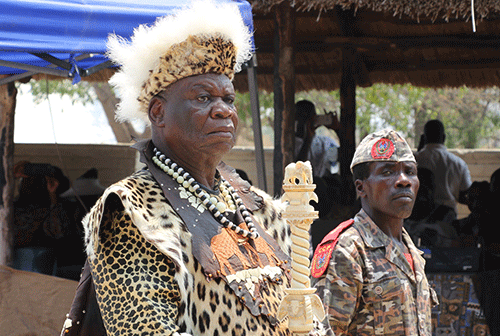CHINCHIMANE – Hundreds flocked to Chichimane, the royal seat of Chief George Simasiku Mamili VII of the Mafwe Traditional Authority, to celebrate the annual Lusata Cultural Festival.
They included the Mafwe and other ethnic groups from all over the country and across the borders.
In his remarks, Mamili described the festival as the pride of the Mafwe community, as it promotes unity in diversity.
He stressed that there is a need for the youth to understand the historical events and changes their people have experienced before and after independence.
Mamili stated that he is troubled by the persistent drought, which has affected the lives of people and their livestock in Zambezi.
To address this, he called on the government to consider “accelerating the drilling of boreholes for potable and clean water supply to affected areas”, as well as “increase the supply of animal feed, coupled with the subsidised financing of tractors
and other agricultural implements to communal farmers”.
He added that the aftermath of the drought has seen an increased number of wildlife, especially elephants, which
pose a threat of escalating human-wildlife conflict.
As such, he recommended that the government control the number of wildlife.
The Mafwe Traditional Authority further called on the government to invest in mobile clinics to improve the lives of rural communities as well as extend rural electrification, as most residents still live in darkness.
Mamili appealed to the government, traditional authorities and residents to hold peaceful elections on 27 November.
Deputy Prime Minister John Mutorwa, who was the keynote speaker at the festival, cautioned Namibians to celebrate their cultural festivals without undermining other tribes and their cultures.
At the same time, he thanked the Mafwe Traditional Authority for always hosting the annual Lusata Cultural Festival, as it paves the way for young people to learn about their traditions.
He emphasised that cultural norms and traditions, as well as customary laws, need to be preserved because they give value and identity to the nation.
He added that government appreciates assistance from traditional authorities in shaping the nation.
“If we relax to value our culture, to practice our culture and to transmit that culture to young people, I can tell you the young people, the generations that are coming, will not know who they are,” noted Mutorwa.
Meanwhile, Zambezi governor Lawrence Sampofu pointed out that Namibians enjoy peace and stability in the country because they accept diversity.
He said peace must be guarded jealously because it is delicate and difficult to mend when broken.
“It is only in a supremacy atmosphere where people can gather at this moment to enjoy the fruits of our culture and economic development,” Sampofu said.
Also in attendance was the ombara otjitambi (paramount chief) of a section of the Ovaherero people, academic Hoze Riruako.
He commended the Mafwe community and residents of the Zambezi region for upholding traditional respect, norms and traditions.
He added that the traditional respect portrayed at the festival is worth emulating by other traditional authorities in the country.
He also called for the inclusion of traditional authorities in structures that will enable them to contribute not only to traditional but political leadership.
He invited Mamili to their annual cultural festival held in July at Okahandja.
The festival has been celebrated annually ever since it was introduced by then Mafwe chief Richard Muhinda Mamili V, with the help of his close friend Andrew Matjila in 1981. Matjila and Muhinda are honoured
by the Mafwe people for this initiative, which always brings young people together to feast and celebrate their rich cultural, heritage spanning centuries.
With the help of Matjila, Muhinda designed the royal mace, which the festival derives its name from.
The royal mace belongs to the reigning chief of the Mafwe, and is transferred to the next chief who takes over.
Once a year when this time comes, the ivory-encrusted royal mace is always held aloft by the chief for everyone at the festival to see.
The royal mace symbolises unity and peace among the Mafwe people.
*Aaron Mushaukwa is an information officer at the Ministry of Information and Communication Technology in Zambezi.



